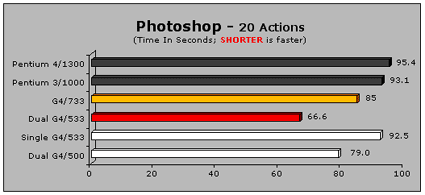Bare Feats heeft een aantal benchmarks gepost waarin de prestaties van de nieuwe PowerPC 7450 aka G4+ wordt vergeleken met de oude PPC 7400/7410. De resultaten geven een tamelijk zorgwekkende situatie weer waarin de G4+ op 733MHz in sommige gevallen trager is dan een single G4 op 533MHz en in vrijwel alle gevallen een dual G4 op 533MHz voor zich moet dulden. De redenen voor deze teleurstellende prestaties zijn nog onduidelijk. Sommigen beweren dat de on-chip full-speed L2 cache en extra execution units niet voldoende zijn om het performance verlies goed te maken dat wordt veroorzaakt door de diepere pipelines van de PPC 7450. De korte pipelines van de huidige G4 zijn een belangrijke reden voor de relatief goede IPC performance van deze processor, maar zijn tevens oorzaak van de het feit dat de G4 naar huidige maatstaven een erg lage kloksnelheid heeft. Een vergelijkbaar problemen zagen we in het verleden voorkomen bij de Cyrix 6x86, die weliswaar een 25% hogere integer-performance had dan de Pentium, maar op termijn niet in staat bleek om de Pentium qua kloksnelheden (of kromme 'PR-ratings') bij te houden.
Het lijkt onwaarschijnlijk dat de langere pipeline ondanks de nieuwe features van de PowerPC 7450 een dermate groot verlies van relatieve performance zullen opleveren. Andere meningen zeggen daarom dat OS 9.1 niet efficiënt overweg gaat met het nieuwe L2 en L3 cache architectuur van de PowerPC 7450. Dit probleem zou opgelost moeten worden in MacOS X. Onderstaand het commentaar van MacOS Rumors:
Realistically, the verdict is still out....but the numbers so far do look bad. All of the information we've seen on the PPC 7450 suggests that the added processing units, better data paths, and on-chip full-speed L2 cache should offest the deeper pipelines which are designed to trade off raw performance for higher clock rates. The 7450 should -- and this is backed up entirely by Motorola and Apple sources who have never had trouble calling their employers on hiding problems or flaws -- perform better than the 7400/7410 at the same clock rate for some operations (Altivec, Integer) and only slighly slower for others (Floating Point math, gaming) -- under no circumstances should it be having trouble competing with 533MHz 7400s, which according to some of the benchmarks coming out these days it is.
The consistent statement from sources is that the current Mac OS doesn't make the right assumptions in its memory management code to properly use the 7450's new on-chip L2 and backside L3 cache architecture, nor make the best use of its improved on-chip data paths or Altivec units. Mac OS X will do much better at this, but there are still changes Apple may need to make to its hardware (128-bit MaxBus support would be cool, but 128-bit memory is presently too expensive for Apple's taste) to really make the most of the 7450.
 |

